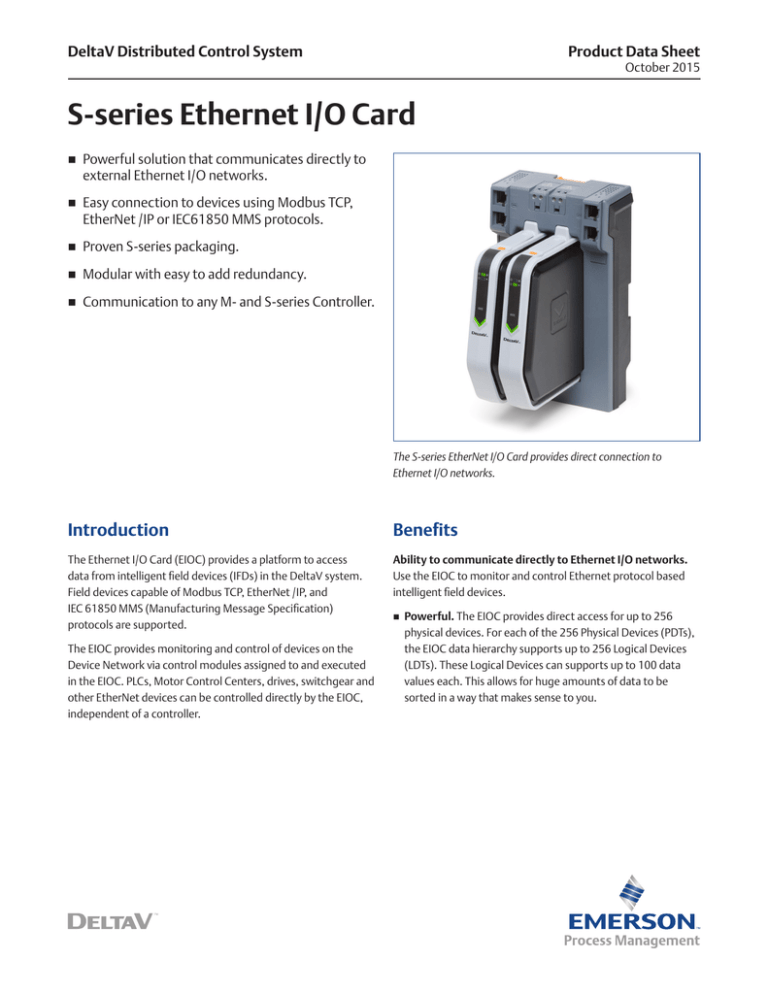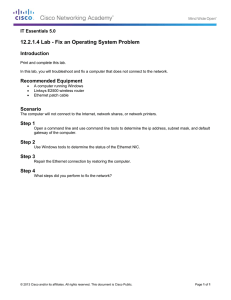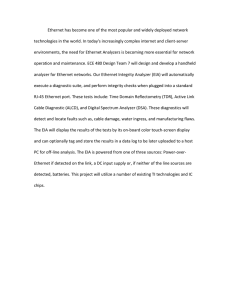
DeltaV Distributed Control System
Product Data Sheet
October 2015
S-series Ethernet I/O Card
Powerful solution that communicates directly to
external Ethernet I/O networks.
Easy connection to devices using Modbus TCP,
EtherNet /IP or IEC61850 MMS protocols.
Proven S-series packaging.
Modular with easy to add redundancy.
Communication to any M- and S-series Controller.
The S-series EtherNet I/O Card provides direct connection to
Ethernet I/O networks.
Introduction
Benefits
The Ethernet I/O Card (EIOC) provides a platform to access
data from intelligent field devices (IFDs) in the DeltaV system.
Field devices capable of Modbus TCP, EtherNet /IP, and
IEC 61850 MMS (Manufacturing Message Specification)
protocols are supported.
Ability to communicate directly to Ethernet I/O networks.
Use the EIOC to monitor and control Ethernet protocol based
intelligent field devices.
The EIOC provides monitoring and control of devices on the
Device Network via control modules assigned to and executed
in the EIOC. PLCs, Motor Control Centers, drives, switchgear and
other EtherNet devices can be controlled directly by the EIOC,
independent of a controller.
Powerful. The EIOC provides direct access for up to 256
physical devices. For each of the 256 Physical Devices (PDTs),
the EIOC data hierarchy supports up to 256 Logical Devices
(LDTs). These Logical Devices can supports up to 100 data
values each. This allows for huge amounts of data to be
sorted in a way that makes sense to you.
S-series Ethernet I/O Card
Monitoring. Data values integrated into the EIOC can be
used in Control Modules running inside the EIOC. These
control modules allow alarm generation, history collection,
and viewing by the operator, as with control modules running
in a Controller using traditional DeltaV native I/O.
Supports Control Functionality. In addition, function blocks
allowing for discrete control and limited PID control are
supported for the EIOC. Motors, valves, variable frequency
drives; field devices that communicate with EtherNet /IP
can be controlled directly from the EIOC.
Easy to connect to devices using Modbus TCP,
EtherNet /IP or IEC61850 MMS protocols. Use the EIOC
Ethernet based protocols to connect your DeltaV system
to your Ethernet I/O device networks.
Huge data capacity. Each EIOC is capable of handling a
huge amount of Data in up to 2000 Control Modules. The
data can be collected from 256 physical devices that have
up to 256 logical devices and a total of 32,000 data values.
EIOC. Part of the I/O Network. 60 EIOC’s can be added to
the DeltaV I/O Network, allowing maximum freedom in
segregating networks.
Flexible networking. User configurable IP addressing for
the device network allows the EIOC to be used in almost any
plant environment regardless of the networking scheme.
Simply put, the EIOC and the Ethernet field devices must
be on the same IP subnet to communicate.
Easy to add Redundancy. Redundancy can be added to
the EIOC by simply adding a second Ethernet I/O Card on
the dual universal carrier. The configuration will change
automatically confirming that the two cards are now working
as a redundant pair. Manual switchovers can be controlled in
DeltaV Diagnostics.
Easy to use. The EIOC is easy to use as it represents a native way
to bring Ethernet protocol based data into the DeltaV system.
Specific ease of use features include:
You can choose between the 3 different Ethernet based
protocols included in the EIOC. Each EIOC supports one
protocol and once the protocol license is assigned, the
protocol can be selected from the drop down list. Just
select the one you want to use from the drop down menu.
Updates for the Ethernet I/O Card and their drivers are
included within the DeltaV releases.
www.emersonprocess.com
October 2015
Configured in DeltaV Explorer All needed configuration
for the Ethernet I/O data is done in the DeltaV Explorer and
DeltaV Control Studio, like tradition I/O signals. The data
can be configured in DeltaV Control Modules, displayed
on DeltaV Operate graphics and stored in the DeltaV
Continuous Historian.
Modular, easy to add Redundancy. The dual universal carrier
hosts all the needed components for a redundant setup, which
includes redundant Power input Terminals as well as redundant
Ethernet Isolation ports, isolating the redundant ACN
communication from the redundant Ethernet device Network.
For the EtherNet device network, both the Modbus TCP and
EtherNet /IP protocols support redundant communications.
The IEC61850 MMS protocol supports simplex communication
on the device network.
Product Description
The EIOC is a big pipe for the integration of process data from
3rd party devices, such as PLCs and smart field devices such as
Intelligent Field Devices (IFDs) and Intelligent Electronic Devices
(IEDs). A network of these Ethernet devices can be directly
connected to the EIOC. The devices can communicate to the
EIOC using one of three protocols; Modbus TCP, EtherNet /IP,
and IEC61850 MMS. The EIOC lives in the I/O network of the
DeltaV hierarchy and, like the CIOC, can be placed remotely
in an enclosure in the field.
The EIOC is an independent embedded data server. This means
that there is no need for a separate controller to process the
data being integrated into the EIOC. Control Modules needed
to process the data from the field devices are assigned and
executed in the EIOC. In this way, communications with the
devices are fast and direct. Any parameters from the modules
running in the EIOC can be read by both S-series and M-series
controllers using External References when needed in control
strategies at the controller level.
When configuring the EIOC Control Modules, all typical
Function blocks needed for continuous operation are available;
however, the usage of the following Function blocks are limited
in the EIOC:
256 EDC’s and DCC’s – used for such applications as motor
control in MCCs.
26 PID’s – analog control where all or most of the signals are
Ethernet based.
2
S-series Ethernet I/O Card
4 SEQs – Sequence function block used for sequencing motor
control states.
4 STDs – State Transition Diagram - used in sequencing and
can be used with the SEQ function blocks.
Batch control, SFCs, PLMs, and Equipment Modules are not
supported in the EIOC. PCSD discrete control modules are
not supported in the EIOC. The EDC and DCC function blocks
replace the functionality in these modules and eliminate
loading issues. The new PCSD library will have new module
classes utilizing the new function blocks.
October 2015
Providing access from the EIOC control modules to the DeltaV
Operator Interface graphics follows the same rules and
mechanisms as control modules running in the controllers
in a DeltaV System.
The same is true for the alarms and history collection.
To maintain the capacity of the EIOC, consideration should be
taken to keep modules as lean as possible. Heavy configuration
in the modules will decrease the capacity of 2000 modules in
the EIOC.
Listed by category, the following is a complete list of the
function blocks available with the EIOC.
Advanced Control – None.
Advanced Functions – State Transition, Step Sequencer.
Analog Control – Analog Tracking, Calc/Logic, Filter, Input
Selector, Scaler, Signal Characterizer, Signal Generator, Signal
Selector, Bias/Gain, Manual Loader, PID, Rate Limit, Ramp,
Splitter, Limit.
Simplex EIOC (Protection cover installed in the redundant EIOC slot
in the dual universal carrier).
Energy Metering – None.
IO – Alarm Detection, AI, AO, DI, DO.
Logical – All except DC.
Math – All.
Special Items – All.
Timer Counter – All.
www.emersonprocess.com
The EIOC mounts on the dual universal carrier which includes
redundant Power input Terminals as well redundant Ethernet.
Isolation ports. The Ethernet Isolation ports isolate the
redundant ACN communication from redundant Ethernet
based Device Networks by acting like the Controller firewall.
In this way, Robustness and Security is ensured.
3
S-series Ethernet I/O Card
October 2015
The DeltaV system with a redundant EtherNet I/O Card and simplex connection to the intelligent field devices.
Supported Industrial
Ethernet Protocols:
Modbus TCP Interface
The Modbus TCP interface will support Modbus data sources
such as programmable logic controllers (PLCs); motor control
centers (MCCs), analyzers and similar devices communicating
Modbus TCP. The Modbus TCP interface is a Modbus client
(Master) reading and writing data from/to Modbus servers
(Slave devices). The Modbus server devices can be Modbus TCP
devices or Modbus serial devices using a Modbus TCP gateway.
The Modbus TCP interface supports the following types of data
access using the Modbus TCP protocol:
Reading input data from Modbus Coils, Discrete Input,
Holding Registers, and Input Registers.
Writing output data to Coils and Holding registers.
www.emersonprocess.com
All reads will be performed periodically and outputs will be
sent when they are written.
EtherNet /IP Communications
The EtherNet /IP protocol allows data sources such as PLCs,
and Intelligent Field Devices (IFDs), such as variable-speed
drives, MCCs, and analyzers; as well as other devices
communicating EtherNet /IP to connect directly into
the DeltaV DCS via the EIOC.
The EtherNet /IP interface will support connections for both
implicit and explicit messaging to allow access to both Class 1
and Class 3 EtherNet /IP I/O adapter devices. Redundancy with
EtherNet /IP Class 1 Implicit and Class 3 Explicit messaging
for control (sending outputs to the devices) require special
considerations due to exclusive owner communications defined
by the protocol. Please refer to the DeltaV System Planning
Guide for more information. Class 3 PCCC and UCMM
with Logix tags message classes are also supported.
4
S-series Ethernet I/O Card
October 2015
IEC 61850 (MMS)
Summary
The IEC 61850 MMS interface will allow data from Intelligent
Electronic Devices (IEDs) such as motor protection relays,
motor starters, motor control centers, switchgear, and similar
MMS-based devices to be integrated into DeltaV. The MMS
interface will be a client reading and writing data from/to the
Intelligent Electronic Device which acts as the server. Device
network redundancy is not supported for the IEC61850 MMS
protocol in DeltaV v13.
The EIOC supports communications with Ethernet based
devices using Modbus TCP, EtherNet /IP, and IEC61850 MMS.
The EIOC supports up to 256 devices and 32000 signals.
Polling and switchover times vary based on protocol, device
type, and loading. Refer to the DeltaV System Planning Guide
for more information.
Goose applications are not supported for the EIOC.
EIOC Licensing
Licensing is easy with the EIOC. Buy the hardware assembly for
the EIOC which can be simplex or redundant, no license there.
Only one protocol per EIOC is permitted, and you pick the
license for the protocol desired. DST licenses are assigned based
on the LDTs and highest point value in the LDT.
The EIOC capacity lends itself to very large integration projects
with limited control needs.
Batch components such as SFCs and PLMs are not supported
in the EIOC. Extensive external referencing to the EIOC for
applications such as VFD control and Batch control is not
advised. See the PDS for the VIM2 which supports
those applications.
EIOC and DualUniversal Carrier.
www.emersonprocess.com
5
S-series Ethernet I/O Card
October 2015
EIOC Ethernet Isolation Port.
Hardware Specifications
Common Environmental Specifications (all components)
Operating Temperature
-40 to 70°C (-40 to 158°F)
Storage Temperature
-40 to 85°C (-40 to 185°F)
Relative Humidity
5 to 95% , non-condensing
Protection Rating
IP 20, NEMA 12
Airborne Contaminants
ISA-S71.04-1985 Airborne Contaminants Class G3
Conformal coating
Shock
10 g ½-sine wave for 11 ms
Vibration
1mm Peak-to-Peak from 2 to 13.2 Hz;
0.7g from 13.2 to 150 Hz
Carrier Specifications
Specifications for Dual Universal Carrier
Capacity
One (simplex) or two (redundant) EIOC
Input Power
+24 VDC ±10% at 1 A maximum
Redundant Ethernet connections via replaceable
Ethernet Isolation Ports (EIPs)
Copper twisted pair: 10/100BASE-TX with RJ45 connectors;
Full duplex operation - 100 m distance
Mounting
DIN rail latch to horizontally orientated T-type rail
www.emersonprocess.com
6
S-series Ethernet I/O Card
October 2015
EIOC Hardware Specifications
Specifications for the Ethernet I/O Card
Number of EIOCs Per System
60
Input Power
+24 VDC ± 10% at 325 mA maximum for simplex;
575 mA maximum for redundant
Heat Dissipation (Redundant)
7 Watts maximum for simplex; 13 Watts maximum
for redundant
Fuse Protection (Internal)
Internal Non-replaceable Fuse
Mounting
One or two slots on the Dual Universal Carrier
Communication
Redundant Ethernet connections via Dual Universal Carrier
to the:
a) Device Network
b) Area Control Network (ACN)
ACN Network Addressing
Auto Assigned during commissioning
Device Network Addressing
Manual, Master only
Control Module Limit
2000
Max Data Values Sent
4000/second
Max Data Values Received
500/second
Max I/O Network Nodes
300
Module Execution Rates
100ms, 200ms, 500ms, 1s, 2s, 5s, 10s, 30s, 60s
LED Indicators
Green – Power
Indicates DC power is applied
Red – Error
Indicates an error condition
Green – Active/Standby
Indicates operating mode of each EIOC
Yellow flashing – Pri./Sec. CN
Indicates valid control network communication
www.emersonprocess.com
7
S-series Ethernet I/O Card
October 2015
Certifications
Certifications
The following certifications are available for the EIOC:
The EIOC will be submitted for the following certifications:
CE:
Marine Certifications:
- EMC- EN 61326-3-1:2006
- LVD: Directive 2006/95/EC Aug 2007
FM:
IACS E10:2006 Rev.5 Control, Protection & Safety;
DNV 2.4:2006
- ABS Certificate of Design Assessment
- FM 3600, Dec. 2011
- Bureau Veritas Certificate
- FM 3611, Dec. 2004
- DNV Marine Certificate
- FM 3810, Jan 2005
- Lloyds Register
- ANSI/ISA 60079-0, Oct 2009
- ANSI/ISA 60079-15, Jul 2009
CSA:
EAC Hazardous Area certification Zone 2
(Russian, Belarus, Kazakhstan)
Hazardous Area/Location:
(Reaffirmed 2008)
The EIOC can be installed and used based on the
following Standards:
- CSA C22.2 No. 61010-1, 2004
FM (USA):
- CSA C22.2 No. 213-M1987, 1987
(Reaffirmed 2009)
- CAN/CSA-E60079-0, 2007
- CAN/CSA-E60079-15, March 2002
(Reaffirmed 2006)
ATEX:
- ATEX 94/9/EC
- EN60079-0: 2009
- EN60079-15:2005
Class I, Division 2, Groups A, B, C, D, T4
cFM (Canada):
Class I, Division 2, Groups A, B, C, D, T4
ATEX:
Ex nA IIC T4 Gc
IEC-Ex:
Ex nA IIC T4 Gc
Regarding the Installation instructions please refer to the following Documents:
Class 1 Division 2 Installation Instructions DeltaV S-Series
12P5402 Rev. C
Zone 2 Installation Instructions DeltaV S-Series 12P5404 Rev. C
- EN60079-15:2010
IEC-Ex:
- IEC60079-0:2007
- IEC60079-15:2005
- IEC60079-15:2010
www.emersonprocess.com
8
S-series Ethernet I/O Card
October 2015
Ordering Information
Description
Model Number
Simplex Ethernet I/O Card (EIOC) Assembly, (Includes EIOC, Dual Universal Carrier,
Universal Carrier Protection Cover, 2 Ethernet Isolation Ports for twisted copper, 2 Power Plugs)
SE4100
Redundant Ethernet I/O Card (EIOC) Assembly, (Includes 2 EIOC, Dual Universal Carrier,
2 Ethernet Isolation Ports for twisted copper, 2 Power Plugs)
SE4101
MODBUS TCP Interface for Ethernet I/O Card (EIOC)
VE4103
EtherNet/IP Interface for Ethernet I/O Card (EIOC)
VE4105
IEC 61850 Interface for Ethernet I/O Card (EIOC)
VE4107
Prerequisites
DeltaV v13.3 Systems and higher
©2015, Emerson Process Management. All rights reserved.
Emerson Process Management
Asia Pacific: 65.6777.8211
Europe, Middle East: 41.41.768.6111
North America, Latin America:
+1 800.833.8314 or
+1 512.832.3774
www.emersonprocess.com/deltav
The Emerson logo is a trademark and service mark of Emerson Electric Co. The DeltaV logo is a
mark of one of the Emerson Process Management family of companies. All other marks are the
property of their respective owners.
The contents of this publication are presented for informational purposes only, and while every
effort has been made to ensure their accuracy, they are not to be construed as warranties or
guarantees, express or implied, regarding the products or services described herein or their
use or applicability. All sales are governed by our terms and conditions, which are available on
request. We reserve the right to modify or improve the designs or specifications of our products
at any time without notice.


